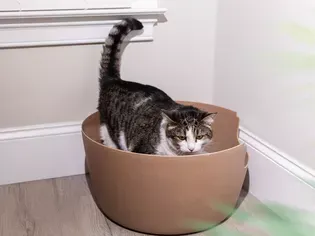Why Cats Don't Always Cover Their Poop
Updated on 04/26/24

Unveiling the Mystery: Why Cats Don't Always Cover Their Poop
As dedicated cat owners, we've all witnessed the meticulous ritual our feline companions engage in after using the litter box – the quintessential act of burying their waste. However, there are times when our furry friends seem to abandon this ingrained behavior, leaving us bewildered and our olfactory senses assaulted. In this comprehensive guide, we'll delve into the fascinating reasons why cats don't always cover their poop, shedding light on the underlying motivations and offering practical solutions.
1. Medical Conditions
Underlying medical conditions can disrupt a cat's normal litter box behavior, including the act of burying their waste. If your cat has suddenly stopped covering its poop, it's essential to consult a veterinarian to rule out any underlying health issues. Urinary tract infections, constipation, diarrhea, and arthritis can all affect a cat's ability to comfortably use the litter box, leading to avoidance behaviors.
2. Litter Box Issues
The type of litter, cleanliness, and location of the litter box can significantly influence a cat's willingness to cover its waste. Some cats are picky about the texture and scent of litter, preferring fine-grained, unscented options. A dirty litter box can also be a major deterrent, as cats instinctively avoid using a soiled toilet. Additionally, if the litter box is placed in a high-traffic area or somewhere your cat feels vulnerable, it may choose to bury its waste outside the box.
3. Anxiety or Stress
Cats are sensitive creatures, and changes in their environment or routine can trigger anxiety or stress. If your cat is feeling anxious or stressed, it may stop covering its poop as a way of marking its territory or communicating its discomfort. Identifying and addressing the source of stress is crucial in resolving this issue.
4. Lack of Instincts
Some cats lack the natural instinct to cover their waste. This is particularly common in kittens that haven't fully developed their social and behavioral skills. Additionally, certain breeds, such as Siamese and Orientals, are known for being less inclined to cover their poop.
5. Behavioral Problems
Certain behavioral problems, such as pica (eating non-food items) or coprophagy (eating feces), can also lead to a cat not covering its poop. These issues may stem from underlying medical or psychological conditions and require professional intervention.
Examples to Illustrate the Reasons:
* A cat with a urinary tract infection may experience discomfort while urinating, leading it to avoid the litter box and not cover its waste.
* A cat that prefers fine-grained, unscented litter may not use a litter box filled with coarse, scented litter, opting instead to bury its waste elsewhere.
* A cat that is feeling anxious or stressed due to a new pet or a change in its routine may stop covering its poop as a way of marking its territory or communicating its discomfort.
* A kitten that has not yet fully developed its social and behavioral skills may not know how to cover its waste properly.
* A cat with pica or coprophagy may eat its feces or non-food items, resulting in not covering its waste.
Tips to Encourage Covering Behavior:
* Rule out any underlying medical conditions with a veterinary visit.
* Provide a clean litter box with fine-grained, unscented litter.
* Place the litter box in a quiet, private location.
* Create a calming environment for your cat by providing hiding places and pheromone diffusers.
* Reward your cat with treats or praise when it covers its poop.
* If behavioral issues are suspected, consult with a veterinarian or animal behaviorist.
Understanding the reasons why cats don't always cover their poop is crucial for addressing the issue effectively. By considering medical conditions, litter box issues, anxiety or stress, lack of instincts, and behavioral problems, we can determine the underlying cause and implement appropriate solutions. With patience, care, and the guidance of a veterinarian or animal behaviorist when necessary, we can help our feline friends return to their natural burying habits, maintaining a clean and harmonious living environment.
Explore More Pets

Cat Behavior Problems
How to Stop Aggression in Kittens

Long-Haired Cat Breeds
Siberian Cat: Breed Profile, Characteristics, & Care

Cat Behavior Problems
How to Stop Kittens From Scratching and Biting

Long-Haired Cat Breeds
Turkish Angora: Cat Breed Profile, Characteristics & Care

Basic Training
How to Socialize Your Kitten

Short-Haired Cat Breeds
Cute Pictures & Facts About Calico Cats & Kittens

Litter Box Training
Training Your Kitten to Use the Litter Box

Long-Haired Cat Breeds
10 Fun Facts About White Cats